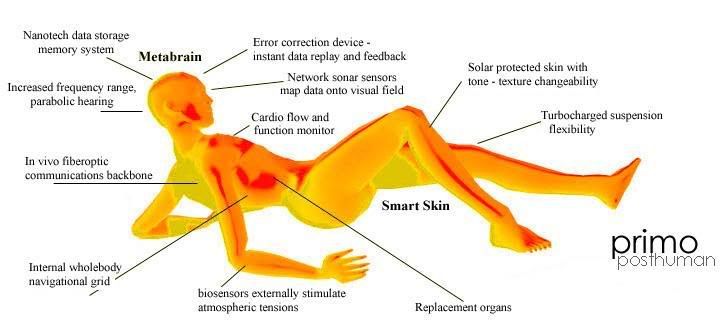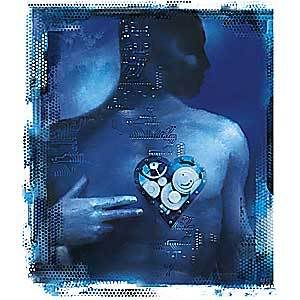Transhumanism (sometimes symbolized by >H or H+) is an international intellectual and cultural movement supporting the use of new sciences and technologies to enhance human mental and physical abilities and aptitudes, and ameliorate what it regards as undesirable and unnecessary aspects of the human condition, such as stupidity, suffering, disease, aging and involuntary death.
Transhumanist thinkers study the possibilities and consequences of developing and using human enhancement techniques and other emerging technologies for these purposes. Possible dangers, as well as benefits, of powerful new technologies that might radically change the conditions of human life are also of concern to the transhumanist movement.
POSTHUMANISM
A posthuman or post-human is, according to transhumanist intellectuals, a hypothetical future being "whose basic capacities so radically exceed those of present humans as to be no longer unambiguously human by our current standards."
The difference between the posthuman and other hypothetical sophisticated non-humans is that a posthuman was once a human, either in its lifetime or in the lifetimes of some or all of its direct ancestors. As such, a prerequisite for a posthuman is a transhuman, the point at which the human being begins surpassing his own limitations, but is still recognisable as a human person or similar.
Posthumans could be a symbiosis of human and artificial intelligence, or uploaded consciousnesses, or the result of making many smaller but cumulatively profound technological augmentations to a biological human, i.e. a cyborg.
Some examples of the latter are redesigning the human organism using advanced nanotechnology or radical enhancement using some combination of technologies such as genetic engineering, psychopharmacology, life extension therapies, neural interfaces, advanced information management tools, memory enhancing drugs, wearable or implanted computers, and cognitive techniques.
A variation on the posthuman theme is the notion of the "Posthuman God"; the idea that posthumans, being no longer confined to the parameters of "humanness", might grow physically and mentally so powerful as to appear possibly god-like by human standards.
This notion should not be interpreted as being related to the idea portrayed in some soft science fiction that a sufficiently advanced species may "ascend" to a superior plane of existence - rather, it merely means that some posthuman being may become so exceedingly intelligent and technologically sophisticated that its behaviour would not possibly be comprehensible to modern humans, purely by reason of their limited intelligence and imagination.
At what point does a human become posthuman? Steven Pinker, a cognitive neuroscientist and author of How the Mind Works, poses the following hypothetical, which is an example of the Ship of Theseus paradox:
Surgeons replace one of your neurons with a microchip that duplicates its input-output functions. You feel and behave exactly as before. Then they replace a second one, and a third one, and so on, until more and more of your brain becomes silicon. Since each microchip does exactly what the neuron did, your behavior and memory never change. Do you even notice the difference? Does it feel like dying? Is some other conscious entity moving in with you?
The difference between the posthuman and other hypothetical sophisticated non-humans is that a posthuman was once a human, either in its lifetime or in the lifetimes of some or all of its direct ancestors. As such, a prerequisite for a posthuman is a transhuman, the point at which the human being begins surpassing his own limitations, but is still recognisable as a human person or similar.
Posthumans could be a symbiosis of human and artificial intelligence, or uploaded consciousnesses, or the result of making many smaller but cumulatively profound technological augmentations to a biological human, i.e. a cyborg.
Some examples of the latter are redesigning the human organism using advanced nanotechnology or radical enhancement using some combination of technologies such as genetic engineering, psychopharmacology, life extension therapies, neural interfaces, advanced information management tools, memory enhancing drugs, wearable or implanted computers, and cognitive techniques.
A variation on the posthuman theme is the notion of the "Posthuman God"; the idea that posthumans, being no longer confined to the parameters of "humanness", might grow physically and mentally so powerful as to appear possibly god-like by human standards.
This notion should not be interpreted as being related to the idea portrayed in some soft science fiction that a sufficiently advanced species may "ascend" to a superior plane of existence - rather, it merely means that some posthuman being may become so exceedingly intelligent and technologically sophisticated that its behaviour would not possibly be comprehensible to modern humans, purely by reason of their limited intelligence and imagination.
At what point does a human become posthuman? Steven Pinker, a cognitive neuroscientist and author of How the Mind Works, poses the following hypothetical, which is an example of the Ship of Theseus paradox:
Surgeons replace one of your neurons with a microchip that duplicates its input-output functions. You feel and behave exactly as before. Then they replace a second one, and a third one, and so on, until more and more of your brain becomes silicon. Since each microchip does exactly what the neuron did, your behavior and memory never change. Do you even notice the difference? Does it feel like dying? Is some other conscious entity moving in with you?


No comments:
Post a Comment